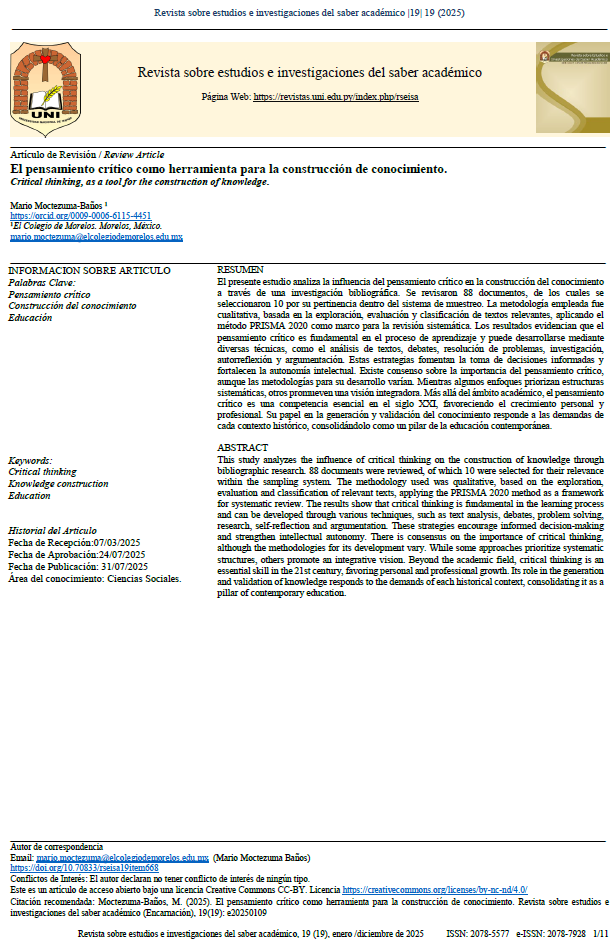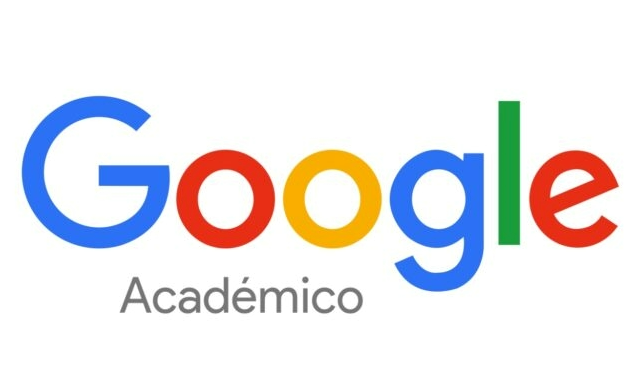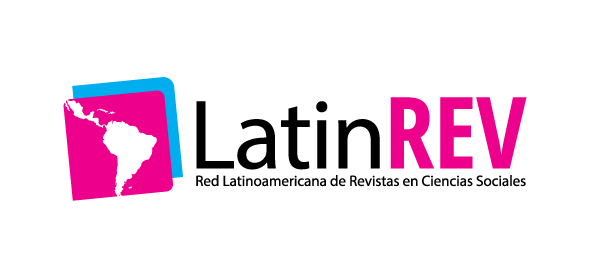El pensamiento crítico como herramienta para la construcción de conocimiento
DOI:
https://doi.org/10.70833/rseisa19item678Palabras clave:
Pensamiento Crítico, Construcción del Conocimiento, EducaciónResumen
El presente estudio analiza la influencia del pensamiento crítico en la construcción del conocimiento a través de una investigación bibliográfica. Se revisaron 88 documentos, de los cuales se seleccionaron 10 por su pertinencia dentro del sistema de muestreo. La metodología empleada fue cualitativa, basada en la exploración, evaluación y clasificación de textos relevantes, aplicando el método PRISMA 2020 como marco para la revisión sistemática. Los resultados evidencian que el pensamiento crítico es fundamental en el proceso de aprendizaje y puede desarrollarse mediante diversas técnicas, como el análisis de textos, debates, resolución de problemas, investigación, autorreflexión y argumentación. Estas estrategias fomentan la toma de decisiones informadas y fortalecen la autonomía intelectual. Existe consenso sobre la importancia del pensamiento crítico, aunque las metodologías para su desarrollo varían. Mientras algunos enfoques priorizan estructuras sistemáticas, otros promueven una visión integradora. Más allá del ámbito académico, el pensamiento crítico es una competencia esencial en el siglo XXI, favoreciendo el crecimiento personal y profesional. Su papel en la generación y validación del conocimiento responde a las demandas de cada contexto histórico, consolidándolo como un pilar de la educación contemporánea.
Descargas
Referencias
Bavaresco, A. (2017). Investigación educativa. Caracas: Tricolor. Recuperado de https://1library.co/document/oz1n80dy-proceso-metodologico-en-la-investigacion-bavaresco-reduc.html1Library+1ISBN Cloud+1
Chrobak, R. (2017). El aprendizaje significativo para fomentar el pensamiento crítico. Archivos de Ciencias de la Educación, 11(12), 5–14. https://doi.org/10.24215/23468866e031
Corzo, A., & Chacón, C. (2018). Desarrollo del pensamiento crítico desde la perspectiva de un grupo de docentes universitarios. Acción Pedagógica, 27(1), 34–49. Recuperado de https://dialnet.unirioja.es/descarga/articulo/7442971.pdfDialnet
Cuadra, A. (2020). El pensamiento crítico como competencia básica: Una propuesta de nuevos estándares pedagógicos. IXTLI: Revista Latinoamericana de Filosofía de la Educación, 2(4), 127–148. Recuperado de https://dialnet.unirioja.es/descarga/articulo/7568883.pdf
Deroncele, A., Nagamine, M., & Medina, D. (2020). Desarrollo del pensamiento crítico. Maestro y Sociedad, 17(3), 532–546. Recuperado de https://www.researchgate.net/profile/Angel-Deroncele-Acosta/publication/343079756_Desarrollo_del_pensamiento_critico_Development_of_critical_thinking/links/5f15a1d892851c1eff219960/Desarrollo-del-pensamiento-critico-Development-of-critical-thinking.pdfResearchGate+1ResearchGate+1
González, L. (2020). Enseñanza de la biología y pensamiento crítico: La importancia de la metacognición. Revista de Educación en Biología, 23(1), 1–21. Recuperado de https://ri.conicet.gov.ar/handle/11336/113407CONICET Digital
Gutiérrez, F. (2020). Una reflexión interdisciplinar sobre el pensamiento crítico. Revista Latinoamericana de Estudios Educativos, 50(1), 11–39. Recuperado de https://www.redalyc.org/pdf/1341/134135724002.pdfRedalyc+1Redalyc+1
Jadad, A. R., Moore, R. A., Carroll, D., Jenkinson, C., Reynolds, D. J., Gavaghan, D. J., & McQuay, H. J. (1996). Assessing the quality of reports of randomized clinical trials: Is blinding necessary? Controlled Clinical Trials, 17(1), 1–12. https://doi.org/10.1016/0197-2456(95)00134-4
Martín, M. (2013). Análisis histórico y conceptual de las relaciones entre la inteligencia y la razón. [Tesis doctoral, Universidad de Málaga]. Repositorio Institucional RIUMA. Recuperado de https://riuma.uma.es/xmlui/handle/10630/2666Riuma
Micheli, A. (2015). En torno a la evolución del pensamiento científico. Archivos de Cardiología de México, 85(4), 323–328. Recuperado de https://www.archivoscardiologia.com/previos/%282015%29%20ACM%20Vol%2085.%204%20OCTUBRE-DICIEMBRE/ACMX_2015_85_4_323-328.pdfarchivoscardiologia.com
Ortiz, M. (2018). Elementos ontológicos del pensamiento crítico. Teoría de la Educación. Revista Interuniversitaria, 30(1), 53–74. https://doi.org/10.14201/teoredu3015374Academia+2Revistas eUSAL+2Revistas eUSAL+2
Page, M. J., McKenzie, J. E., Bossuyt, P. M., Boutron, I., Hoffmann, T. C., Mulrow, C. D., ... & Moher, D. (2021). The PRISMA 2020 statement: An updated guideline for reporting systematic reviews. BMJ, 372, n71. https://doi.org/10.1136/bmj.n71
Robles, P. (2019). La formación del pensamiento crítico: Habilidades básicas, características y modelos de aplicación en contextos innovadores. Revista de Ciencias Humanísticas y Sociales, 4(2), 13–24. Recuperado de https://www.redalyc.org/pdf/6731/673171022002.pdfRedalyc
Tamayo, O. (2017). Interacciones entre naturaleza de la ciencia y pensamiento crítico en dominios específicos del conocimiento. Enseñanza de las Ciencias, 35(3), 521–526. Recuperado de https://ddd.uab.cat/pub/edlc/edlc_a2017nEXTRA/32_-_Interacciones_entre_Naturaleza_de_la_Ciencia_y_Pensamiento_Critico.pdfDipòsit Digital de Documents+1Dipòsit Digital de Documents+1
Tamayo, O., Zona, R., & Loaiza, Y. (2015). El pensamiento crítico en la educación: Algunas categorías centrales en su estudio. Revista Latinoamericana de Estudios Educativos, 11(2), 111–133. Recuperado de https://dialnet.unirioja.es/servlet/articulo?codigo=8669287Dialnet
The Adecco Group. (2022). Pensamiento crítico y toma de decisiones. Recuperado de https://www.adeccoinstitute.es/talento-y-formacion/pensamiento-critico-y-toma-de-decisiones/
Uribe, R., & Gutiérrez, M. (2023). Concepciones acerca del pensamiento crítico en la enseñanza primaria y secundaria: Una revisión bibliográfica. Revista Innova Educación, 5(1), 91–107. https://doi.org/10.35622/j.rie.2023.01.006ResearchGate+1Revista Innova Educación+1
Velázquez-Tejeda, M. E., Cruzata-Martínez, A., Flores-Chirinos, J. O., & Jiménez-Chumacero, R. V. (2023). El pensamiento crítico: un reto de la enseñanza actual. Revista Conrado, 19(91), 125–131. Recuperado de https://conrado.ucf.edu.cu/index.php/conrado/article/view/2930

Publicado
Número
Sección
Categorías
Licencia
Derechos de autor 2025 Mario Moctezuma Baños

Esta obra está bajo una licencia internacional Creative Commons Atribución 4.0.
Licencia de Atribución Creative Commons CC-BY
Usted es libre de:
Compartir — copiar y redistribuir el material en cualquier medio o formato.
Adaptar — remezclar, transformar y construir a partir del material para cualquier propósito, incluso comercialmente.
Bajo los siguientes términos:
Atribución — Usted debe dar crédito de manera adecuada, brindar un enlace a la licencia, e indicar si se han realizado cambios. Puede hacerlo en cualquier forma razonable, pero no de forma tal que sugiera que usted o su uso tienen el apoyo de la licenciante.










